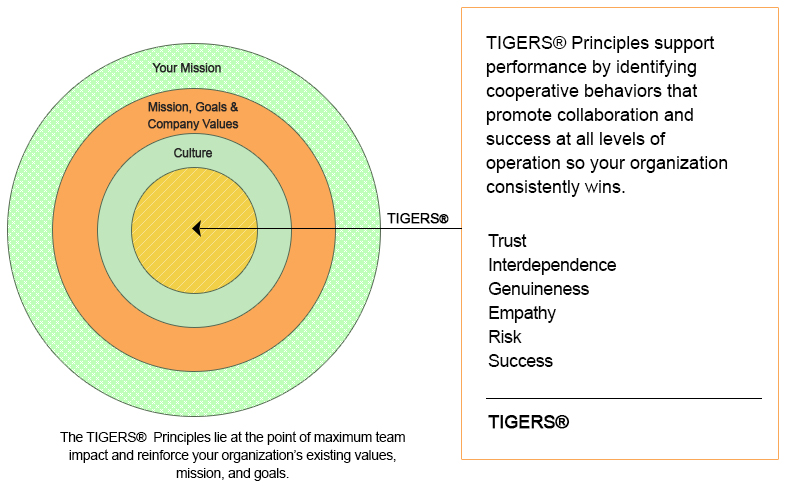
According to Gallup, small businesses create 65 percent of desirable new jobs. In the United States, 50 percent of all jobs are found in small businesses. New small businesses are important for communities to thrive economically. Therefore, what does it mean to accept risk and leap into entrepreneurship when it is natural to desire reduced risk?
Many new businesses suffer higher than normal risk compared to larger, established companies. For example, if a small businesses of ten employees lose one to a competitor, that is 10% of the workforce. Likewise loans to small businesses tend to be harder to get until a small business has a track record with good to best revenue streams. So, securing funding is not easy to do, when the desire is to reduce risk.
As the fifth of six TIGERS principles required for developing high performance teams and work cultures where cooperation among employees and collaboration between departments is the norm, risk by definition is the potential for making a mistake that can result in loss or injury. It is a necessary for small business growth and success. The failure to risk results in stagnation and lack of growth.
What risk looks like for small business comes in many forms. These forms include uncertainty in profits, lower-than-expected sales volumes or unforeseen catastrophes or events that affect sales or innovation. But without risk, there can’t be the reward. For the good of the whole economy, brave entrepreneurs benefit from carefully assessing their risks, developing strategies to reduce risk and holding a firm determination to push ahead toward success.
Four team building tips to reduce risk in entrepreneurial endeavors
 Listen to your gut to reduce risk.
Listen to your gut to reduce risk.
According to The Psychology of Entrepreneurs Drives Business Outcomes, successful entrepreneurship is largely determined by gut instinct that people either possess or they don’t. This isn’t to say that business owners can’t learn business tactics that lead to success. People who possess an intuitive gut instinct, however, are more likely to be successful as an entrepreneur than those who don’t possess this skill.
Gut instinct comes into play with risks that might not seem worth it on paper. An example is investing in a certain start-up without a proven track record or hiring a passionate leader without much experience in the field. Entrepreneurs with this skill typically take these risks that other leaders might not, which can lead to major gains and rewards.
Build your self-confidence to reduce risk.
Self-confidence is one of the most important attributes for entrepreneurs to possess. Many people stand in their own way when it comes to taking on risks, such as starting their own businesses.
When tackling a new endeavor, many people may find that others are quick to doubt their ability and point out the several obstacles they are about to face. If you are not confident in your own abilities, you may find that these criticisms are too much to handle. They may convince you to give up.
Instead, surround yourself with positive people who are supportive of your endeavors. Then work to empower yourself as well. Don’t rely only on outside influences to build you up. Build yourself up from the inside out to succeed.
 Remember to delegate to reduce risk.
Remember to delegate to reduce risk.
As an entrepreneur, it’s easy to get burnt out after building your business from the ground up. Many entrepreneurs find that after being an employee for so long, they are struggling to make the transition into CEO.
While having a hand in every part of the organization made sense as your business was in the infant stage, once it’s full grown, you may struggle to keep up with all of its demands. That’s why delegating is so important.
Create a team of leaders who you trust with your vision, and let go of the reigns while still keeping an eye on the progress. It’s important to stay informed. By delegating, you are able to free up valuable time so you can focus on other areas of business growth.
Make a plan to reduce risk.
Your time is extremely valuable. You can only get so much done in a day.
To get the most out of your day, create a plan for the next day before you head to bed. Create an outline of the tasks that you need to get done during the following day, and focus on one task at a time throughout the day.
Multi-tasking may seem like an effective strategy, but it actually slows you down and hinders your productivity. Instead, focus on each individual task without distractions for a set amount of time and then take a break before moving on. You’ll find that you complete more tasks and are more productive throughout the day.
Define your success to reduce risk.
The idea of success is different for everyone. What does success look like for you? A large paycheck? Work-life balance? Quarterly vacations?
There are many definitions for success. Popular nonfinancial returns for entrepreneurs include intellectual stimulation, the ability to give back and the ability to build your personal brand. While some entrepreneurs may be doing nothing more than breaking even, they are receiving valuable returns on their investment that have nothing to do with money. So if you want to be a successful entrepreneur, define what success means to you and work toward that goal.
Small businesses are prevalent in society, and they are essential for the economy as a whole. Creating new and coveted positions, small businesses grow and strengthen the economy in ways that large organizations cannot. That’s why it’s so important for individuals to take the plunge into entrepreneurship. Some team building tips for successful entrepreneurship include listening to your gut, building your self-confidence, delegating, making a plan and defining your own success.
Care to dig deeper into this conversation?
More information can be found in the following resources:
- The Psychology of Entrepreneurs Drives Business Outcomes
- You Are Your Biggest Obstacle in Becoming an Entrepreneur
- Five Ways To Succeed As An Entrepreneur
- 6 Things You Can Do Every Day to Become a Better Entrepreneur
- How Do Entrepreneurs Define Success?
Copyright TIGERS Success Series, Inc. by Dianne Crampton
About TIGERS® Success Series

We specialize in developing high performance work cultures. Scaled to grow as your organization and leadership performance grows, our proprietary Team Behavior Profile, Management training workshops, and online micro training packages are based on the six principles we have found to be the right mix to make this happen.
The TIGERS 6 Principles are Trust, Interdependence, Genuineness, Empathy, Risk and Success. Born from our many years of business, psychology, and educational group dynamic research, and subsequent four years of independent evaluation, we instill and sustain behaviors that improve work group performance and talent retention for measurable ROI.
For more information or to request a presentation to your group or association, call 1+877-538-2822. To subscribe to our complimentary newsletter, click here.

